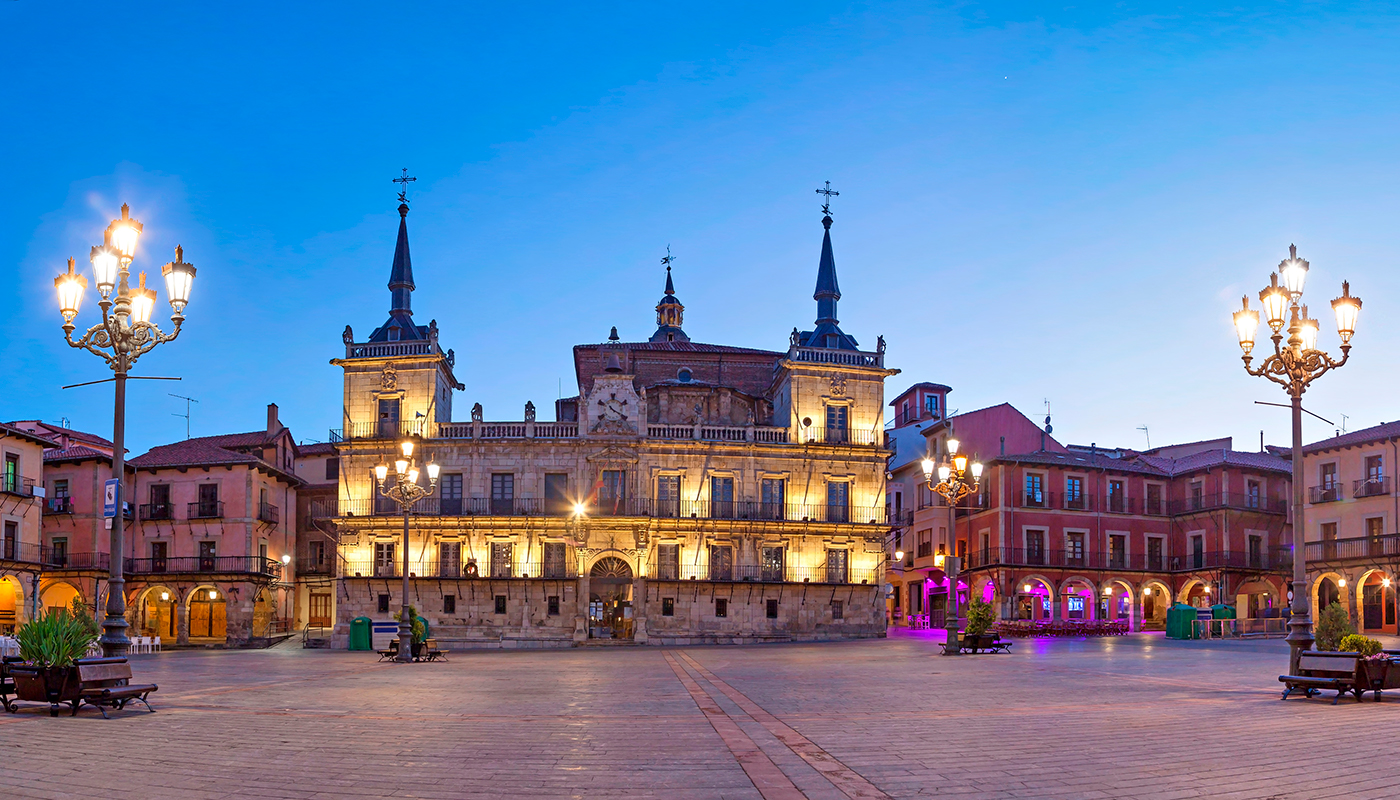Bulgarian cuisine is a mosaic of flavours reflecting centuries of history and an enviable wealth of natural resources. From the valleys where fresh vegetables are grown to the mountains that offer unique cheeses and yoghurts, each corner of Bulgaria leaves its mark on the table. Its cuisine, influenced by the Balkans, the Mediterranean and the Middle East, is notable for the simplicity of its ingredients, its fresh but intense flavours and generous use of herbs and spices. Bulgarian yoghurt, famous for its authenticity thanks to the Lactobacillus bulgaricus bacteria, and sirene cheese, the basis of many dishes, are just two of the culinary treasures that define this gastronomic tradition. Tasting traditional Bulgarian food is like unravelling a cultural map: from the banitsa that accompanies family celebrations to the tarator that cools you down on hot summer days, each recipe tells a story of identity and belonging.
Tarator: freshness in a bowl
Tarator is more than just a cold soup, it is an institution in Bulgarian cuisine, especially during the hot summer months. The dish, based on yoghurt, fresh cucumber, garlic, ground walnuts, dill and a touch of olive oil, is the perfect ally to beat the heat. It is usually served with a piece of fresh bread, making it a light and refreshing option for both lunch and dinner.
What makes tarator unique is not only its taste but also its cultural significance. In Bulgaria, yoghurt is much more than an ingredient: it is a national symbol. The Russian bacteriologist Ilya Mechnikov is said to have attributed the longevity of Bulgarian peasants to regular consumption of yoghurt. Thus, tarator not only nourishes but also connects the eater with the deepest roots of Bulgarian identity.
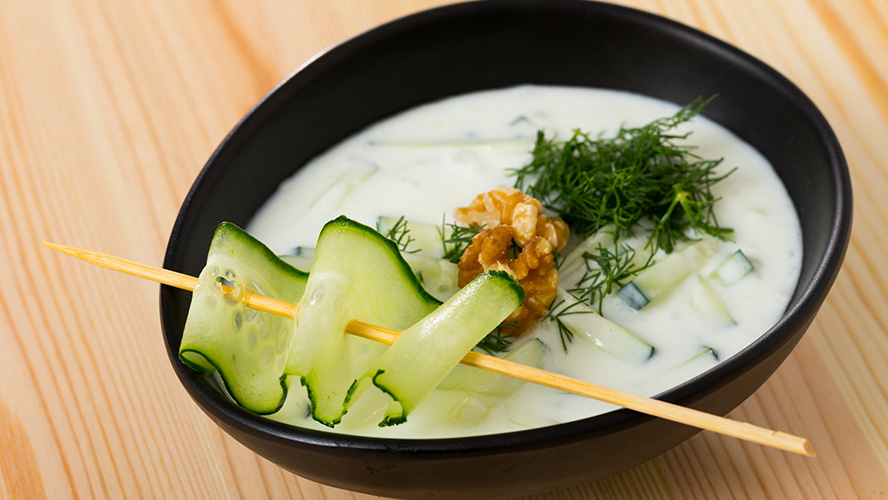
Gyuvetch: a stew that captures the Bulgarian soul
Gyuvetch is a traditional dish combining meat, vegetables and spices cooked slowly in a ceramic pot. The stew takes its name from the pot in which it is prepared, and its ingredients vary according to the region and season. The most common include beef or lamb, potatoes, carrots, aubergines, peppers and tomatoes, all seasoned with herbs such as thyme and bay leaves.
To cook the dish one needs patience, allowing the flavours to mingle and intensify. In many Bulgarian families, gyuvetch is served on special occasions or on holidays, accompanied by a fresh salad and a piece of homemade bread. The stew symbolises the warmth of home and the importance of sharing moments around the table.
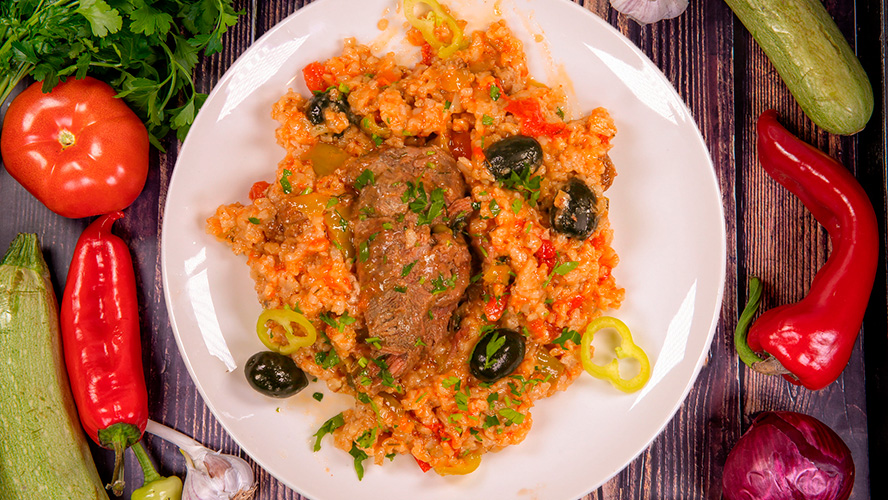
Moussaka: beyond the Greek version
Although moussaka is known all over the world thanks to its Greek variant, the Bulgarian version has its own personality. Instead of aubergines, the basis here are potatoes, interspersed with layers of minced meat, usually pork or beef, and topped with a yoghurt and egg mixture that is cooked au gratin to a golden brown colour.
Moussaka is one of Bulgaria’s best-loved home-cooked dishes, perfect for family meals. What sets it apart from its Greek counterpart is the softer texture and the combination of spices, such as paprika and black pepper, which give it a comforting flavour.
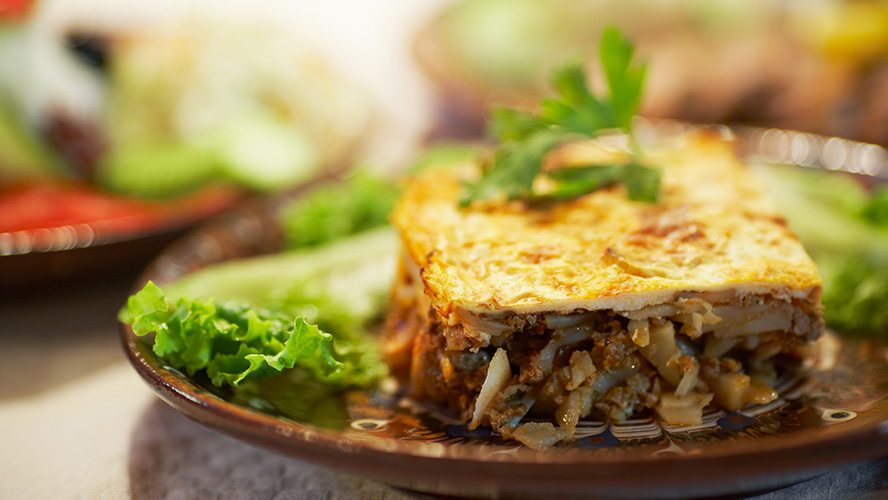
Lyutika: a touch of spice in each mouthful
Lyutika is a traditional Bulgarian sauce or salad made from roasted peppers, tomatoes, garlic and spices with a spicy kick that varies according to the cook’s taste. The versatile side dish is often served with grilled meats or simply with fresh bread, and is especially popular in rural areas of the country.
Preparing lyutika is a ritual in itself, especially during the harvest season, when fresh peppers are at their best. Each family has its own recipe, handed down from generation to generation, making this dish a unique expression of Bulgarian culinary heritage.
Banitsa: the flavour of celebrations
Banitsa is one of Bulgaria’s most iconic dishes, enjoyed both in everyday life and on special occasions. This savoury pastry is made with layers of filo pastry filled with a mixture of white cheese, yoghurt and eggs, although you can also find variations that include spinach and meat or even a sweet version with apples.
During the Christmas holidays, it is common to hide coins or good luck messages in it, making it a symbol of prosperity and hope for the new year. Each bite of the pastry combines the crunchy texture of the dough with the mild, slightly sour taste of the cheese.
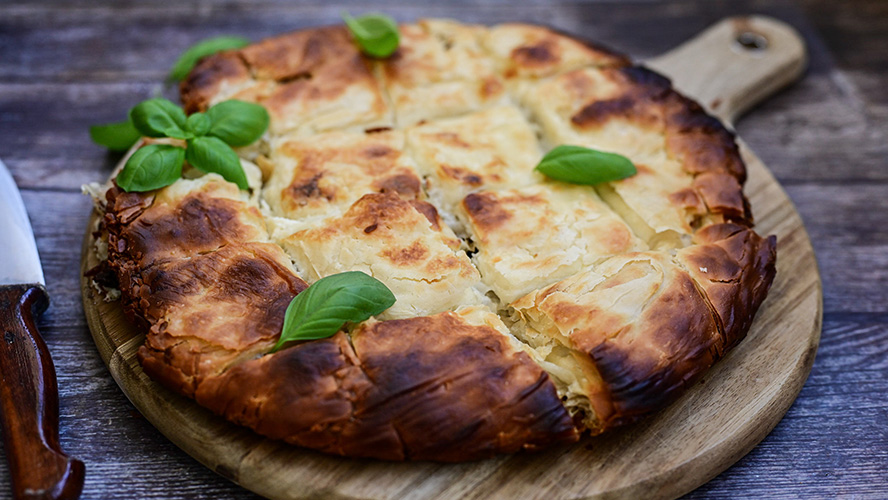
Traditional confectionery: for those with a sweet tooth
Out of all Bulgarian sweet treats, baklava occupies a special place, albeit with a local touch that sets it apart from other Balkan or Turkish versions. The dessert, made with layers of filo pastry, walnuts and syrup, is a delicacy found in almost every bakery in the country.
Another traditional sweet treat is tikvenik, a cake filled with grated pumpkin, sugar and cinnamon, wrapped in filo pastry. The dessert, associated with autumn and festivities, is another example of how simple ingredients can be transformed into something extraordinary.

Traditional drinks: making a toast with rakia and Bulgarian wine
Bulgaria’s national drink is undoubtedly rakia, a fruit brandy served as an aperitif at almost every gathering. The most common varieties are made from plums or grapes and, although their alcohol content may vary, they are always enjoyed in small quantities.
Bulgarian wine also deserves a special mention, especially the varieties produced in regions such as the Thrace Valley or the area of Melnik. Local grapes, such as Mavrud and Melnik, produce wines with intense, unique flavours reflecting the character of Bulgarian soil.
For fans of non-alcoholic beverages, boza, a lightly fermented drink made from cereals, is an interesting experience. Its sweet taste and thick texture may seem unusual at first, but it is an integral part of the country’s gastronomic culture.

















































